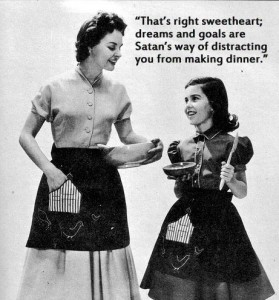Labeling Hallee (as a Homemaker)
Read the labels
 Modern culture assigns many labels to women.
Modern culture assigns many labels to women.
- working mother
- career woman
- stay-at-home-mom (SAHM)
- work-at-home-mom (WAHM)
- housewife
- full-time mom
Personally, the label I prefer is that of Homemaker. Big surprise, I know. Why I choose the Homemaker label is because I feel it is the most adequate description of my complete self, encompassing most of the aspects of my designed nature while fairly accurately describing my priorities on this earth.
As for the other labels, Danielle Crittenden writes in What Our Mothers Didn’t Tell Us:
For more than thirty years the women’s movement has told us that we would be happier, more fulfilled human beings if we left our homes and children and went out to work. To the degree that we might feel misgivings or guilt about leaving our babies [for] others to raise, we have been assured that such feelings are imposed upon us by society, and sexist – no more normal for a mother to experience than a father. Instead, we’ve been taught to suppress these worries and to put our work ahead of our families, or at the very least, to attempt to “balance” the demands of boss and baby.
In my opinion, the strategy of the radical feminist movement which peaked during my early childhood was to convince women that they were somehow “incomplete” or not “reaching their full potential” if they didn’t abandon the responsibilities of home in favor of a career outside the home. From what I can tell, this has been a highly effective and remarkably successful strategy.
 Even so, while many continue to rationalize, I believe that culturally we still instinctively acknowledge that women, as laid out to us Biblically, ought to be: thrifty and enterprising; engaged in raising, teaching, nurturing, and caring for our children; mentors for younger women; and partners and helpmates who respect and support our husbands. This sums up the job description of Biblical Womanhood as described in scripture in Titus 2:2-5 and Ephesians 5:22-25. In short, this is God’s design for our sex. It is how our brains are wired to think, how our emotions are wired to respond. I don’t think that changes when a woman works a job that brings in a paycheck, nor do I think it ought to change.
Even so, while many continue to rationalize, I believe that culturally we still instinctively acknowledge that women, as laid out to us Biblically, ought to be: thrifty and enterprising; engaged in raising, teaching, nurturing, and caring for our children; mentors for younger women; and partners and helpmates who respect and support our husbands. This sums up the job description of Biblical Womanhood as described in scripture in Titus 2:2-5 and Ephesians 5:22-25. In short, this is God’s design for our sex. It is how our brains are wired to think, how our emotions are wired to respond. I don’t think that changes when a woman works a job that brings in a paycheck, nor do I think it ought to change.
I feel that the “career woman” label largely belittles womanhood. I believe by limiting womanhood to a “career,” the label eliminates the loving, mentoring, and nurturing aspects of our designed natures. To me it says that this woman, this career woman, places a higher value on her career than anything else. The women I know, personally, who have careers that required goal-oriented focus through school and higher education are some of the most loving wives and attentive mothers that I know.
I take issue with the “working mother” label for similar reasons. I feel the label implies that mothers — such as myself — who aren’t drawing a paycheck outside of the home don’t perform anything society actually considers “work” which is, obviously and to anyone reading this, a preposterous notion. Secondly, the “working mother” label leaves out the many other aspects of my nature — such as wife and mentor — so the label is neither adequate nor accurate. It is insufficient at encompassing my entire nature. When I had a job that took me from my home and my family for 10 hours a day, I never once considered myself a “working mom”. Largely because “mom” is just one of the things that I am.
Conversely, the label “full-time mom” implies that mothers employed outside the home somehow are not mothers “full-time.” Having been a mother employed outside of the home, I can tell you from personal experience that this is simply not the case. Further, and worse in my opinion, “full-time mom” implies that a mother has no need for any other-than-mother parts of herself and is always just in full blown “mom” mode. Therefore, this label discards aspects of my designed nature such as wife and helpmate, thrifty and enterprising, and mentor and minister for younger women.
 Likewise, the antiquated label “housewife” doesn’t apply. Unlike the “mommy” labels, the “housewife” label ignores my motherhood aspect and focuses on my wifely aspect. This also ignores the thrifty, enterprising, mentoring, and ministering aspects of my nature. I think it also brings to mind a woman holding a broom in one hand and a feather duster in the other.
Likewise, the antiquated label “housewife” doesn’t apply. Unlike the “mommy” labels, the “housewife” label ignores my motherhood aspect and focuses on my wifely aspect. This also ignores the thrifty, enterprising, mentoring, and ministering aspects of my nature. I think it also brings to mind a woman holding a broom in one hand and a feather duster in the other.
It goes without saying that there is far more to making a home than four walls and a roof. A house is a structure where people reside. A home is a place where people are loved and nurtured. Additionally, I am in a state of holy matrimony with my husband. I am not, as the term implies, married to the house in which we reside. When my children are all grown and have fled the nest, I will still be Gregg’s wife, not the house’s wife, no matter where we happen live. And wherever we live, our home will be the place where I can bring love and warmth by acts of spirit.
Finally, I strongly feel that the “SAHM Stay-At-Home-Mom/WAHM Work-At-Home-Mom” labels, which have gained the most popularity and acceptance in recent years, do not apply to me. Both SAHM/WAHM labels are highly implicating, focusing first on the “At Home” aspect and, secondly, the “Mom” aspect of our natures exclusively. I am not hanging out “At Home” as if I am playing hookey from “school” or taking a personal day off from my “real” job. I am making a home. In my mind, there is a tremendous difference in both implication and definition.Also, just as with all the other “mommy” labels, both of these SAHM/WAHM labels discard every other aspect of my designed nature by confining me strictly to motherhood.
Language is a funny thing. English has it’s roots the more specific Germanic languages, not in the nuanced romance languages that sprang out of Latin. In modern German, the word “mache” means “to make” or “to work” and both English words “Make” and “Work” are derivative terms.
The SAHM and WAHM labels place far too high an importance on the motherhood aspect of my designed nature. This results in a skewed portrayal of my true priorities. My earthly priorities are (or ought to be) God, husband, children, making our home. My husband’s earthly priorities are (or ought to be) God, wife, children, working to provide. In each case, both of us place earthly priority number 4 as the “mache” requirement of life and our children are number 3. Please don’t get me wrong, my children are an enormously important part of my life. However, they are not the most important number 1 thing in my life, nor are they the only aspect of my life that defines me. Heaven help me if they were!
Neither label strikes me as particularly honoring. To me, the labels do not convey genuine pride, love, respect, or admiration. In fact, they are labels that were designed to be used as labels, not as titles.
In Feminine Appeal, Seven Virtues of a Godly Wife and Mother, Carolyn Mahaney, refers to a “toxic feminist air” that has been “breathed” by society so much that even women who don’t personally consider themselves feminists have adopted the feminist philosophy about working in and out of our homes. How steeped in the feminist and very secular philosophies have we become culturally? Mahaney gently advises us, with humble hearts, to turn to the word of God to see what He has to say about women working at home.
 While nothing in scripture bars wives from working outside of the home, God’s word is clear that husbands are to provide for the home and wives are responsible to take care of , sometimes translated as become stewards of, our homes (1 Timothy 5:8). The woman in Proverbs 31:10-31, whom God considers virtuous, sometimes translated as worthy, and the ideal wife, made her home the focus of her work. And, to you women whom I know and love who have careers by circumstance or by choice, the Proverbs 31 woman does as well – as a land owner who manages her land and as a merchant in the marketplace. But her purpose and her drive in doing so is to first honor her husband and second, honor and provide for her home.
While nothing in scripture bars wives from working outside of the home, God’s word is clear that husbands are to provide for the home and wives are responsible to take care of , sometimes translated as become stewards of, our homes (1 Timothy 5:8). The woman in Proverbs 31:10-31, whom God considers virtuous, sometimes translated as worthy, and the ideal wife, made her home the focus of her work. And, to you women whom I know and love who have careers by circumstance or by choice, the Proverbs 31 woman does as well – as a land owner who manages her land and as a merchant in the marketplace. But her purpose and her drive in doing so is to first honor her husband and second, honor and provide for her home.
God’s word exhorts us to manage, sometimes translated as guide, our homes (1 Timothy 5:14). This word in the original Greek literally means to be the ruler, despot or master of the house. In short, wives are to take full ownership for all of the domestic duties of the household. Not that being the “master” of our house is to in any way undermine the husband’s headship. Rather, our mastery of the home must be in support of his leadership. As God commanded, we are to be our husband’s helper, comforter, and helpmate. (Genesis 1:26-31, 2:7-25; I Corinthians 11:8-9)
In 2001, 73.1 percent of women with children under the age of 18 were in the labor force. In just 1980, that number was only 56.6. Nowadays, you not only have less women at home, you have a culture that has watered down the beauty that is homemaking and replaced it with such terms as “stay at home mom,” as if to say being a homemaker is not worthy of a title.
I was quite a bit older than many of you before I heard the term “SAHM”. Actually, I was pregnant with Scott (so I was 34) and had recently become involved in an online mommy community to connect with other women who were pregnant at the same time with me. Before that, my time online in various communities was largely focused on either writing or politics and current affairs. I actually had to use the thesaurus guide provided by this community to understand what SAHM means. And, I think that’s why I’m able to take such an exception to it. I guess because I didn’t “grow up” with the label around me that I heard it and cringed. It bothered me, and continued to bother me, and continues to bother me. When I read that passage above I had an “Ah-ha!” moment. “…watered down the beauty of homemaking and replaced it with such terms…” That perfectly and accurately describes the exception I take to the SAHM and WAHM labels.
I joyfully claim that title of homemaker. It is a title, not a label. In my opinion, the title homemaker communicates genuine pride, love, respect, and admiration. It also connotes dominion of the home, which strikes me as remarkably biblical. I love making our home. I love making a home that glorifies God, where my husband finds comfort and peace, and where my children thrive. And I believe that my title has been homemaker whether I’ve been putting on a business suit every morning at 6AM or kneading bread dough at 10AM.
So please label me, but don’t call me SAHM. Call me Hallee the Homemaker.
Hallee (the Homemaker)
I’m so grateful for your visit, today.
You would bless me if you added me to your ![]() feed reader or subscribed
feed reader or subscribed  via email.
via email.
You can also become a fan on ![]() Facebook or follow me on
Facebook or follow me on ![]() Twitter. I would love to see more of you!
Twitter. I would love to see more of you!


it makes perfect sense. after i had avery i constantly got criticisism from my uncle who really thought I need to be working, but with the cost of childcare that did not make sense to us.(it basically would take my entire paycheck, so why should i pay someone else to raise my kids?) it still can be something i struggle with…mostly either people jealous(b/c they want too and can’t)or they seem to think I sit around eating bon bons all day watching soap operas. Now my house is not perfect or spotless it is lived in, but we do enjoy delicious food and I do most of the housework(something else my husband and I struggled with, he came from a family where his mom did EVERYTHING for him, and I did not, so he is expected to do a couple things on his own). but you worded it beautifully!
I completely and whole-heartedly agree with all of this. Great post!
I do agree with you on some points. I think that what *you* do is best described as homemaking. I do not think that all parents/spouses that stay home are homemakers. I am 99% sure we have had this discussion before, so I will give you the Reader’s Digest version. ;) **I am using women, but you know in my world it is gender-neutral on this subject**
Women who stay at home for the purpose of raising their children, who expect their spouse to still do cleaning, laundry and cooking are simply stay-at-home-moms. Women who stay home for the purpose of cleaning, laundry and cooking are simply housewives. Women who run the home, which may include childcare, cooking, cleaning and laundry but isn’t limited thereto, are homemakers.
I agree with you that a woman who has a career is not precluded from being a homemaker, because many times this role is handled by women who spend 40 hours a week at the office.
My opinon really differentiates on the subject of husband/wife relationships in marriage, but that is a theoloical discussion for another day. ;)
You’re going to laugh — on my whiteboard where I plot out the posts for the month, I have one that says, “Roles in Marriage” – HAHAHA
I totally agree. I stopped calling myself a SAHM many years ago and adopted the label homemaker when folks would ask me what I “do” It makes me sad when other women look at me with pity when that is my answer. It breaks my heart when some look at me with envy and say “I wish…”
There is something so fulfilling and completing when one does what they were created to do. I was designed to crave my Creator and walk in intimacy with Him, designed to be a helpmeet to my husband, designed to love and raise our children, and designed to be a keeper of my home. When I do these things, it is awesome!
I was reading just this morning in Romans 8:5-8 how a mind focused on God leads to life and peace; conversely, one that focuses on the flesh finds only death. When I am distracted by the things that this world values, it often feels as though a part of me is dying. When I walk out the role God carved for me, I find total peace and life.
I do agree with. I wish I could have been a homemaker but with bad financial choices I am now forced to work. My house is empty it is just my husband and me and 11 animals. I work full time have no nest egg and most of my 53 years has been a financial nightmare I thank God everyday that I have a wonderful job that I love. However if could I would choose to be a homemaker. Great article.
I won’t lie: I really needed this post.
The economy is tough, and my man has been having an awful time of trying to find work. The one place he did find was working him seventy to eighty hours a week with no breaks or lunches OR a single day off for weeks at a time. Yeah, we need the money…but did my DH have to kill himself to bring home a minimum wage paycheck like he was?
After a while of him looking for something new, we talked and decided that I would also look for a job. The idea was that if I found one, I’d work until he found something better, then I could quit and go back to being a homemaker like I, and he, want to be.
Well, within a month, I got a job offer that I’m actually kind of scared about. It pays well. REALLY well, for us. It’s more than he’s ever made in his life, and more than I’ve ever made, too. So now? I’m looking at possibly and potentially NEVER going back to staying at home, taking care of my man and my family like I want.
I’m scared for things to change. I’m worried that I will lose my label or view myself somehow differently. I frequent forums where I consider myself a SAHM and homemaker, and I often have referred to myself that way over the past six years. Now that seems to be going away, and it frightens me. I confessed, tearfully, to him that I’m afraid I’m going to lose my identity, something of myself, because I wasn’t going to be a SAHM or a homemaker anymore; he would be picking up those responsibilities from me for the foreseeable future.
Even worse is my fear that I will be “stuck” working and we will never have more children, as is in our plan for the future. The idea of that is simply crushing to me.
One thing my DH told me was this: “You aren’t a SAHM. You’re not a homemaker. Those are just CONDITIONS at this certain point in your life. Conditions change. We can’t know what God has in store for us today, tomorrow, or any other day. We just have to take these conditions as they come.
“There are a lot of things you actually are: you’re my lover, you’re my best friend, and you’re a mother. You’re beautiful and loving and compassionate. THOSE things will never change, even if the condition in which we’re living might. It’s THOSE things that make up your identity, not some condition like staying at home or going to work.”
I love my DH so much. He’s so smart and intuitive about these sorts of things, and made me feel sooo much better. I thought because it helped me, that I would share in hopes it would help someone else.
Thank you so much for sharing this.
Great post. Our roles are somewhat reversed in my home out of necessity, not desire. I agree with your view that it’s a title, not a label, and I have come to the point where I can finally title myself as a homemaker who also holds a job outside the home. My husband has primary oversight of our 2 teenage boys since he is home all day, and has recently assumed responsibility for homeschooling the youngest. However, that doesn’t lesson my own desire to be the wide and mom my Lord calls me to be. I just haver to learn to juggle my time efficiently.